An interview with Iryna "Cheka" Tsybukh, combat medic, 1998-2024
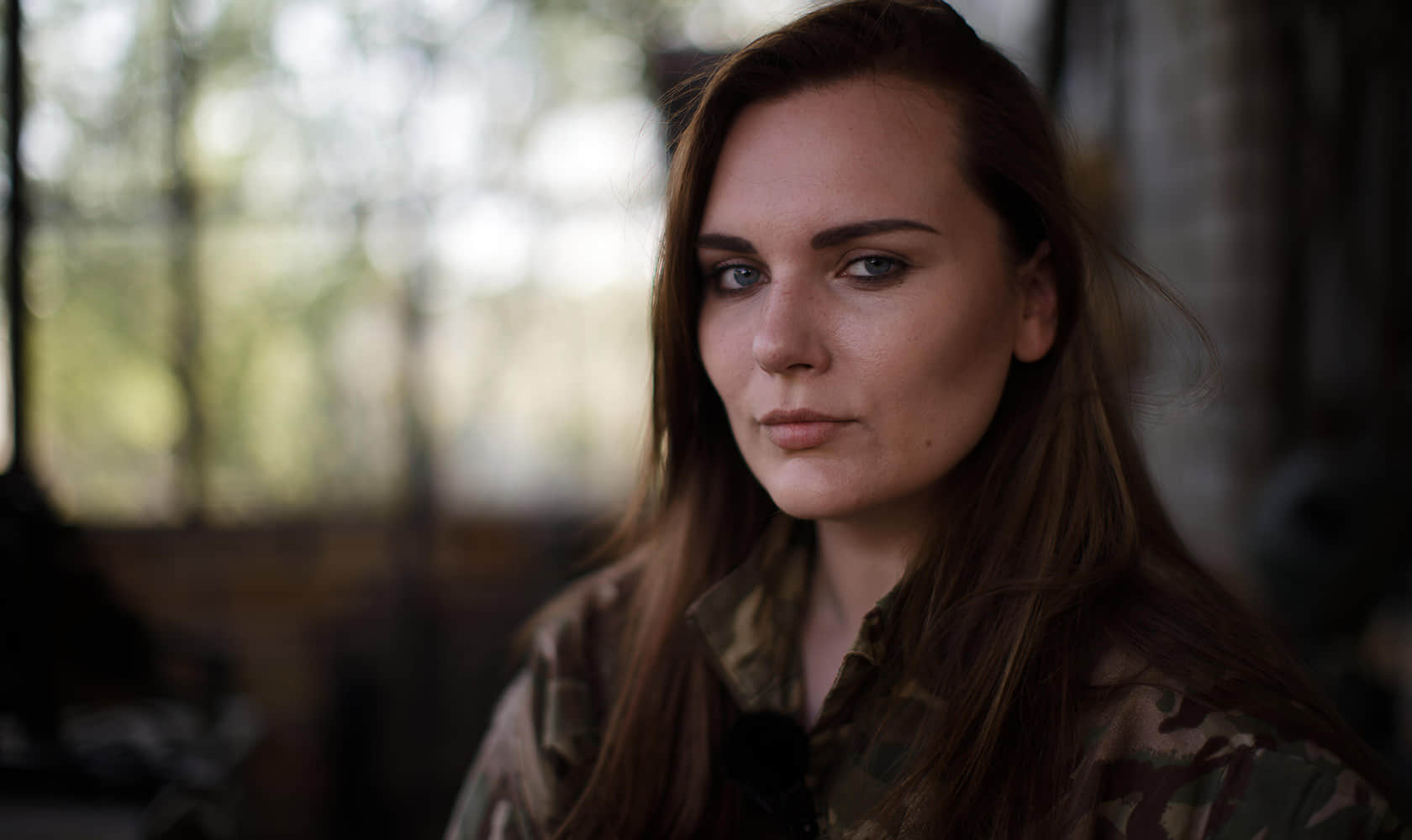
Iryna Tsybukh, 25, who went by the alias Cheka, was a combat medic with the Hospitallers volunteer battalion. She was killed in action on 29 May 2024. This interview was published on 14 May 2024.
One of the best-known сombat medics in the Hospitallers volunteer battalion is definitely 25-year-old Iryna Tsybukh.
She’s a volunteer soldier, a former journalist at the public broadcaster Suspilne, a memory policy activist and a person of principle (too much, some of her friends said), beautiful, and passionate about Ukraine’s east.
The east was where Iryna, as she said herself, grew up as a person, although she came here when she was almost an adult.
Even before Russia’s full-scale invasion, she volunteered for the military along the entire front line. She gave talks about the Revolution of Dignity (and the part she played in it) in the town of Kostiantynivka. She made a film about the liberation of settlements that were captured back in 2014 in Mariupol, and her first documentary about the lives and needs of local teenagers, Vidstan (Distance), in Marinka. That documentary would have been shown in Sievierodonetsk and Kyiv on 24 February 2022, but those plans were disrupted by the Russians.
Iryna is someone who experienced and lived through the war until 2022, with the early victories, the Minsk agreements, and volunteer support for the army.
Iryna had been working as a combat medic in Ukraine’s east for over two years when this interview was published. In March 2024, she won a UP 100. Power of Women award.
We met with her in Kramatorsk, at a house where some soldiers from an Air Assault Forces brigade were living. Iryna had evacuated them from their positions when they were wounded. She answered our questions as she waited here for her evacuation duty to begin.
In this interview with Ukrainska Pravda, Iryna Tsybukh reveals how she grew to love Donetsk and Luhansk oblasts, whether the region has changed over ten years of war, and to what extent her observations at the front coincide with what state policy declares.
Lviv / Makiivka, first trip to Kostiantynivka, changes in the local mood, and fighting instead of peace
Iryna, how did your interest in – perhaps even love for – Ukraine’s east begin?
Love is a very complicated process, and it was only after a very long time, having fully experienced Alla Horska’s creative work, that I was able to formulate an idea of this love for Donetsk and Luhansk oblasts. It's about the human endeavour to feel Ukrainian. [Alla Horska (1929-1970) was a Ukrainian artist, dissident and public figure, and one of the first representatives of the underground. She produced monumental works, mosaics, graphics and paintings. She was murdered by KGB agents – ed.]
What I love most here isn’t the beautiful sunsets, or the landscapes with tourism potential, but the people who, like Alla Horska, feel the need to identify [as Ukrainians]. The USSR gave them no ground to do that, so they have this need to define themselves, to understand, and then to explore.
To do this, it’s not enough to wear a vyshyvanka [a traditional embroidered shirt – ed.], as in Halychyna [Galicia, in Ukraine’s west]. It requires willpower, it requires you to go against the flow. And the people who supported my idea of giving talks about the Revolution of Dignity in schools demonstrated that willpower.
People without this conscious grounding are susceptible to Russian propaganda and all these narratives about "Not everything is so clear-cut" [a Russian narrative which blames the invasion on Ukrainians – ed.]. For them, everything was clear-cut, and they could explain it.
In fact, that’s how my contact with the people here – the people I’ve fallen in love with – first began. They are much stronger than me and my friends, because they held this Ukrainian east; they defended the Ukrainian-ness of this east.
This is not Yanukovych’s east, but the east of the Cossack palankas (fortified settlements), of people who fled dekulakisation and repression [in the 1930s], who sought a better life for themselves, who are able to feel and understand themselves meaningfully. I believe there will be a resurgence of this spirit of the east once all of the few people who are still waiting for Russia have died out.
If we can only win this war.
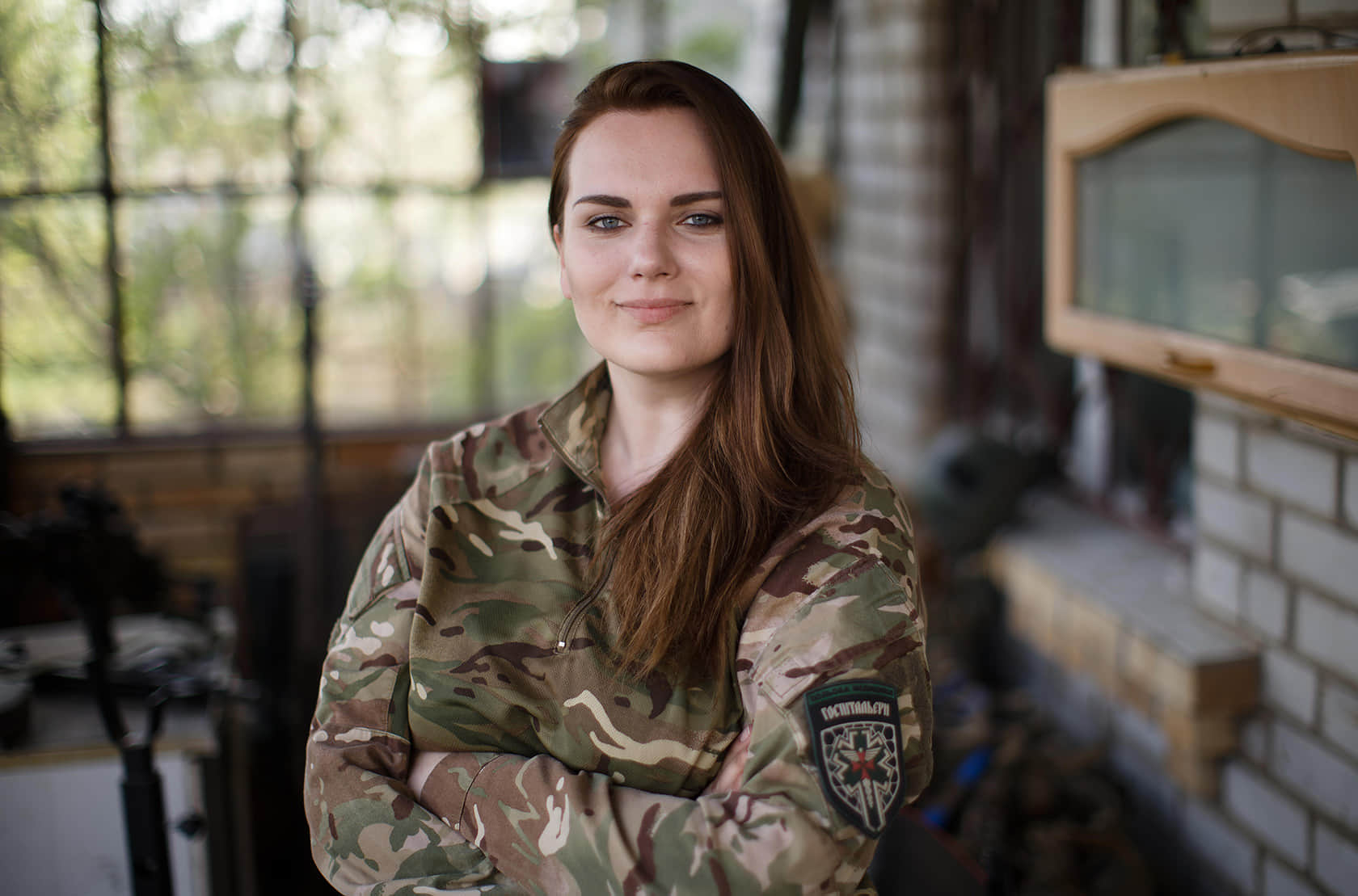
How old were you when you first came here?
I was 17. It was a time of such brightness and naïvety – I thought all we had to do was go into schools in Donetsk and Luhansk oblasts and tell them that the US didn’t pay us to go to the Maidan protests, and everyone would love us. But Russian propaganda had been preemptively at work, and the narratives sown by the adults there were not up for debate.
I definitely wasn’t prepared for hearing the Ukrainian language teacher say – in a room decorated with traditional embroidered towels – "The Maidan is a pimple on your backside," and "Why are you coming here, why are you doing this?" It was a big shock at the time.
Instead, we got an audience of teenagers in schools. I used to say that my job was to plant seeds of doubt about what they’d heard from their parents around the kitchen table.
Now these children – oh, but they are not children anymore... these adults – are in the armed forces, and some have moved to the west of Ukraine. One girl I met in Kostiantynivka said that our talk had pulled her out of the depths.
Are there more pro-Ukrainian people in Donetsk and Luhansk oblasts now?
I think there is simply a crisis of identity, and what’s happened since the full-scale war started is similar to what happened to Alla Horska after she attended the Creative Youth Club. It opened up a way, an opportunity, a place for identifying [as Ukrainian], and this gave a certain impetus to development. [Alla Horska was a member of the Creative Youth Club in Kyiv in 1960-1964. She and other Ukrainian artists and writers raised the issue of the unsatisfactory state of the Ukrainian language and literature in the USSR and demanded that the Soviet government reveal the truth about a mass shooting that the regime had carried out in Kyiv’s Bykivnia. After that, all the members were ideologically persecuted and banned from being hired – ed.]
At the same time, we lack knowledge and understanding of the people whose descendants we are here in Donetsk Oblast—and this is a vast and unexplored piece of historical baggage. I think it has become normal here to feel that we belong to the Ukrainian nation. But there’s still a lot of work to be done.
I just never had this issue of identity, because I was born in an easier environment.
You’re from Lviv, aren’t you?
Yes, I am from Lviv [in the west], but I tell everyone that I’m from Makiivka [in the east]. I was born in an environment where I never had to defend my language or national tradition. The Easter eggs we used to paint with my mother, or the story of my grandmother who was held in the prison on Lontskoho Street [for her pro-Ukrainian position] – it was all part of who I was.
But here, in the east, I met people who, in the 21st century, had to keep fighting to have this opportunity. These people had to make huge efforts just to be themselves. They had to have such a firm and stable ground in order to defend themselves and everyone around them and resist Russian dominance.
This was the first place where my identity began to put out shoots, because you have to fight to be yourself here. And that’s actually a really good feeling.
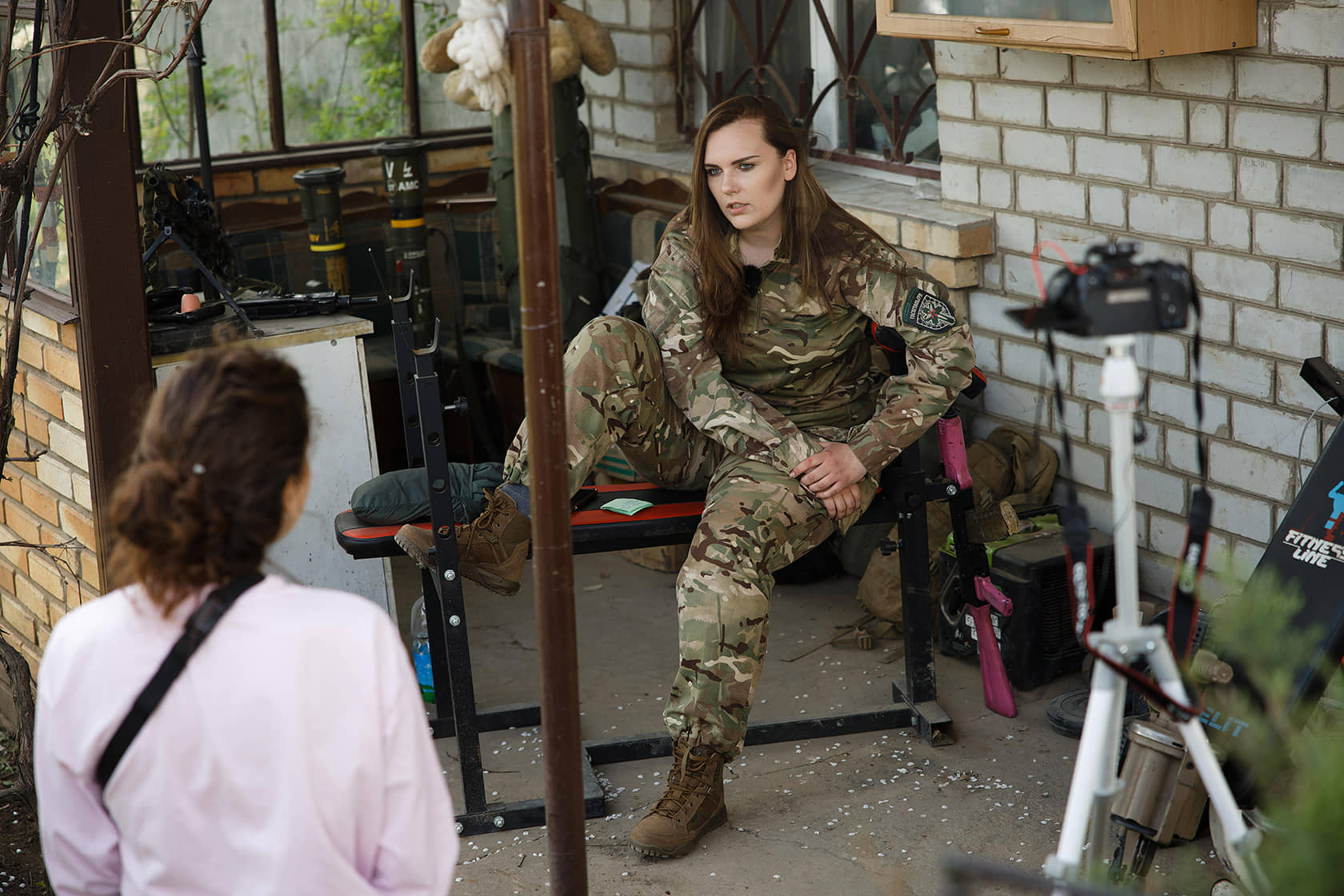
What should the state do so that as many people as possible in Donetsk and Luhansk oblasts feel Ukrainian?
First of all, I would do some research. It would give us an understanding of whether it is worth spending huge amounts of money on re-educating people who think we should go back to the Soviet Union. Ukraine is a very difficult concept for people who miss the Soviet Union, because Ukraine is about struggle, a sense of freedom and responsibility.
People who love the Soviet Union don't know what that is and try to distance themselves from it. I'm not sure we can offer them any alternative.
Instead, after doing some research and assessment, we could build a decent policy of national memory education that would enable people to feel Ukrainian on their local ideological ground. And that ground could be even stronger than the one my family has in Lviv – because the perseverance of the history of Donetsk Oblast, which in fact has never been a wilderness, is incredible.
So, first do the research, then build the policy, reassess, review the policy, then reassess the results again, and so on.
What was Donetsk Oblast if not a wilderness?
When I start talking about Donetsk Oblast as a Cossack region, I have the impression that I used to be a Cossack and rode back from my trips to Donetsk Oblast on horseback (smiles).
First of all, Donetsk Oblast used to be a very pro-European part of this country. And if we go back to earlier times, we can recall the Cossack palankas – places where Cossack families lived. The largest Cossack palankas weren’t in Zaporizhzhia or Mykolaiv oblasts, but here in Donetsk Oblast. We did some missions in Bakhmut, around the Bakhmutka River, and I can understand why the Cossacks settled here! Rivers teeming with fish, the landscape, loads of birds singing in the forest belts that you want [to kill because they might give away your position to the Russians]... well, you know what I mean (smiles).
After pro-European industrialisation began, there was a wave of people who fled here from dekulakisation. And they were also people who shared our very powerful ethnic code, who wanted freedom. Clearly, these are very scary things for Russia.
That's why before the war started in 2014, this was our most vulnerable point. But now, I think, we have become stronger here. And God forbid that my classmates in Lviv who didn’t join the army and go to defend their country become vulnerable.
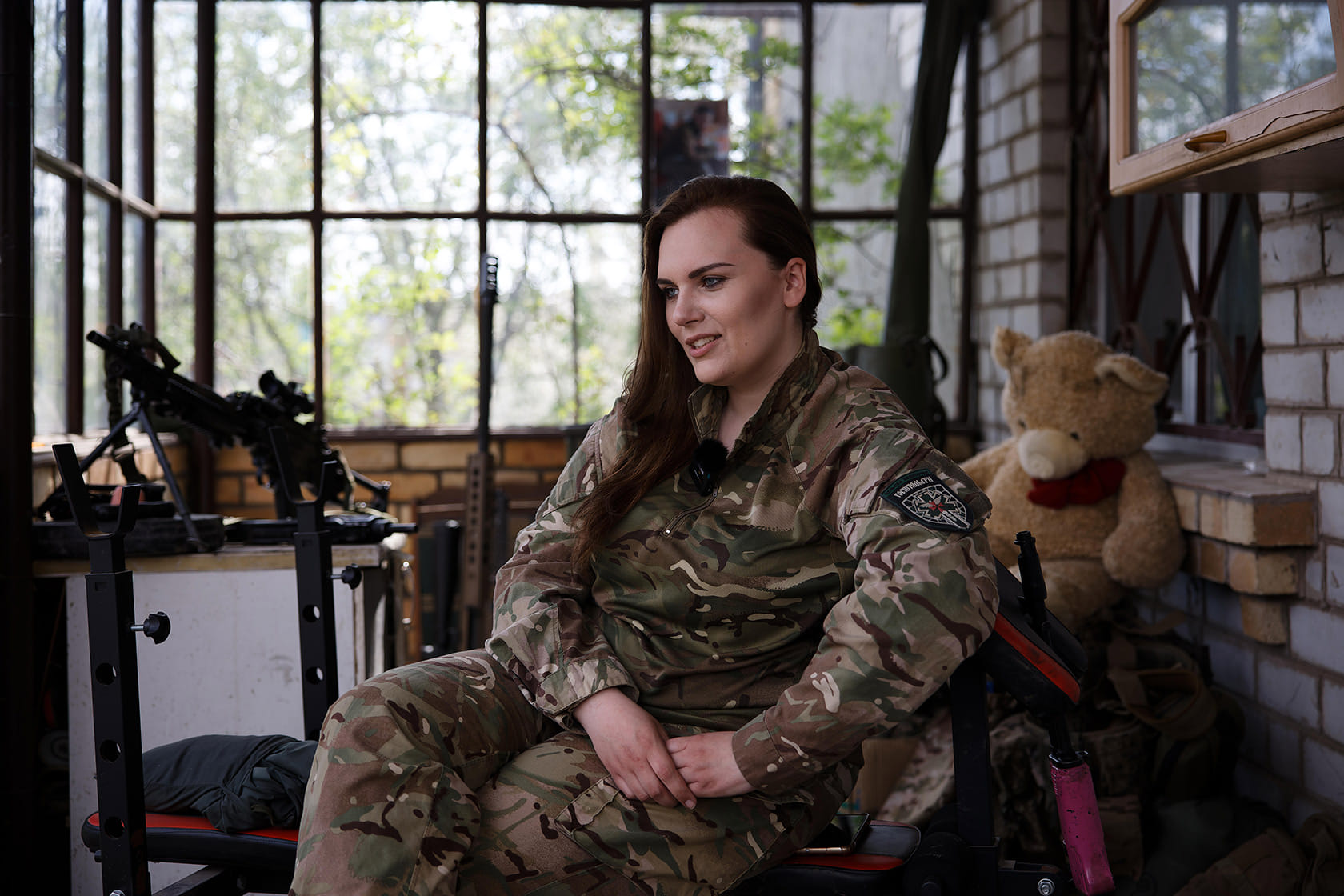
In an interview in 2016, when you were still a student at Lviv Polytechnic, you said this of people from the east: some of the locals are neither pro-Ukrainian or pro-Russian, they’re for whichever one is stronger, because it will be easier and safer with them.
Who do you think is stronger in the east now? Who do people want to follow?
The scary thing is that this desire to follow the one who’s stronger may not just be a problem of the east, but of the whole country, where there is a crisis of identity and alienation from its values. "We've been at war for so long, we want the war to be over soon, it doesn’t matter what happens as long as there’s peace."
It’s scary because there are no values behind it, no freedom behind it, and it’s impossible to find peace for yourself. You’ll be somewhere in the middle, with nothing, in a constant state of war. The desire to regain something that formerly existed has recently manifested itself in the repainted sign at the entrance to Donetsk Oblast.
Now the image of Donetsk Oblast is not beautifully painted letters: it’s the signatures of soldiers who go there on rotation and write "Hello, Cheka!" and the date. Some of them will never come back home.
That's why I'm scared for everyone, not just for the east. Now it seems like everyone is thinking: "As long as it doesn't affect me, as long as I'm not mobilised. The counteroffensive failed, so we’ll have to negotiate somehow." Perhaps the story of "staying with the strong one" applies to Zakarpattia even more than Donetsk...
As for Russia: there will never be peace with Russia. On the other hand, it will never fall apart, the Russian Volunteer Corps will never come to power, and there will be no scenario that you want to believe in. So the word "peace" in the context of our country is a manipulation, a mockery, a pipe dream. Have we ever been at peace?
If peace is not achievable, what do you see as the ultimate goal of your participation in this fight?
Six months ago I thought my fight would end with my demise, but I’m still alive. So I probably have to go on living. That’s what my therapist and I are working on.
Of course, I can say that the ultimate goal is victory, but I don’t know when it will come or what it will be like. So at the moment, my goal is to keep on fighting for my values, for the memory of those who’ve been killed, and for the memory of the vast tragedy that Russia is causing in Ukraine.
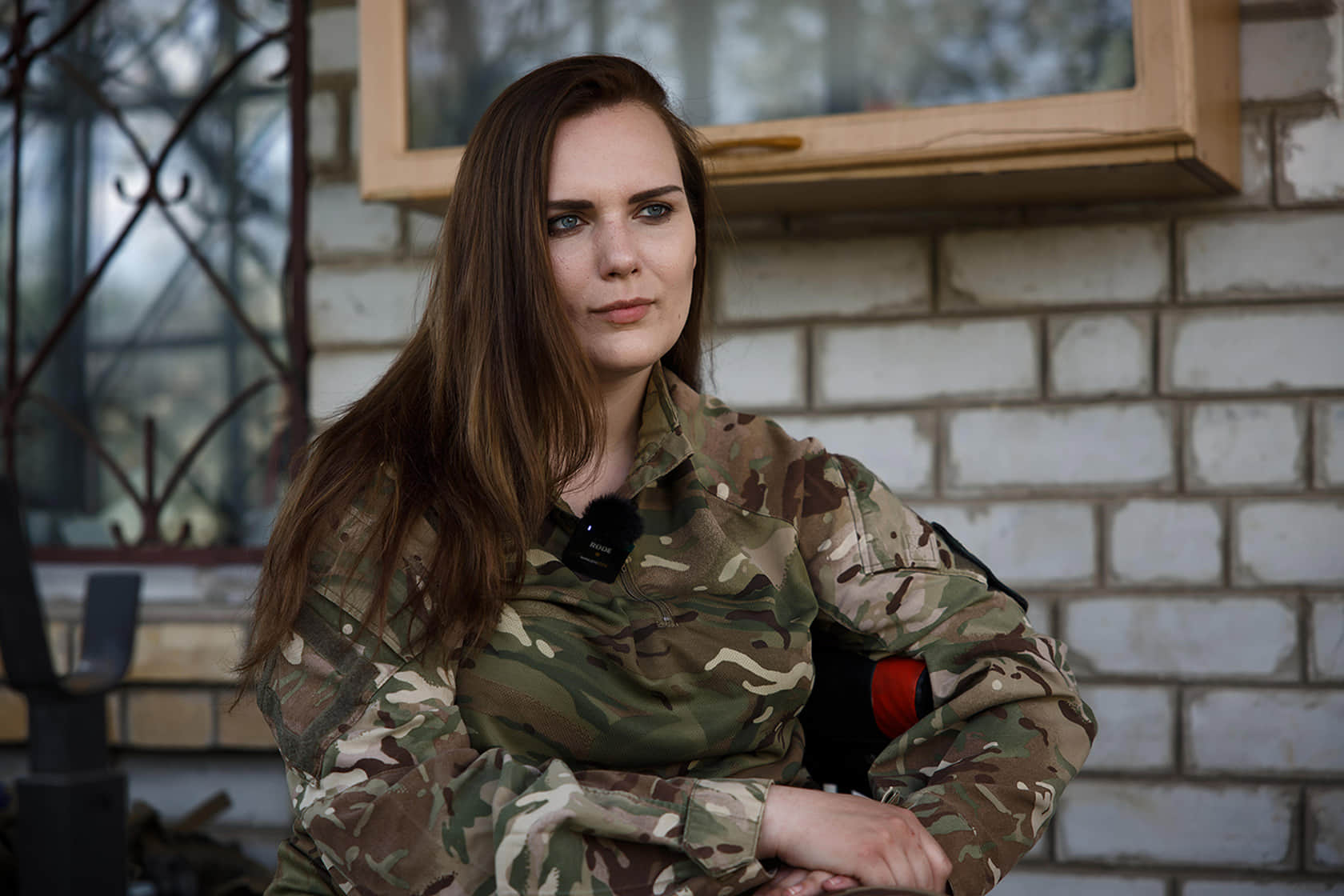
The cool town of Marinka, memories of the Anti-Terrorist Operation, and Iryna’s favourite Bakhmut meme
When was the first time you went on rotation with the Hospitallers?
It was in 2020 in the city of Marinka, I think. I’d had some experience before, but those trips could hardly be called rotations. I had this childish faith that I’d be really useful because I knew how to apply a tourniquet (at a time when people were walking around with Esmarch bandages). My belief that I could help others was stronger than my efficiency as a soldier.
Then I did the Hospitallers training and realised that I knew nothing about combat tactical medicine, and I had a lot to learn. I’ve been learning ever since.
That first trip with the Hospitallers was different from all the others. I’d wanted to support everyone, love everyone and save people with a single tourniquet – then I was confronted with the actual amount of help I had to provide. It’s scary at first.
Sadly, my colleague and I – like hundreds of thousands of other Ukrainians – never got to see Marinka before it was destroyed. What did it look like before the Russians destroyed it?
Two Marinkas exist in my mind. In the first one I was at the positions, and the Minsk Agreements were in force, there was a truce… that version of Marinka was rarely attacked. On my first rotation no one was injured, but I had a huge dog. I used to walk the dog in the frontline area to digest my food better, and I didn’t really feel in danger.
Maybe that "calm war" allowed me to think that we were in a phase of calm. That the horrific war would never return again.
The second Marinka is a cool town where I was making a film about the children of Donetsk and Luhansk oblasts. Two of them were from Marinka. Their mum worked in one of the town’s main shops, where there’d always be soldiers hanging out. The girl played the piano, and the boy knew literally everything and everyone. He was so proud of Marinka, he used to give guided tours of it.
But even the loss of Marinka was not so painful as the settlements of Vodiane and Opytne [on the Avdiivka front in Donetsk Oblast – ed.], where my good friend Mishania was killed. We were on duty back then, seconded to the marines… It was important for me that the position where he died was under the Ukrainian flag. And now all this is occupied by Russia. I feel like I’ve let Mishania and his daughter down.
I think I’m being too pretentious now. But it will only sound pretentious to people who haven’t had to go through this.
A lot of new people have joined us, and some of the younger ones know very little about the Anti-Terrorist Operation [which began in 2014 against Russian military forces and pro-Russian separatists in parts of Donetsk and Luhansk oblasts]. Now we have a new war with completely different weapons, and it’s on another level of intensity. No one’s interested in hearing about how Donetsk Airport was defended. But stories like this are a symbol of our valour, just like [Vadym] Sukharevskyi [a Hero of Ukraine who was the first Ukrainian soldier to open fire on the Russian occupiers in 2014 – ed.]. I would like him to be known not because of his current position [Deputy Commander-in-Chief of the Armed Forces of Ukraine], but for that moment when he gave the order to resist. This is a really important moment. It didn’t happen earlier, it didn’t happen in Crimea. It happened right here.
I would like everyone who has recently joined us to continue this marathon, to take up this flag, to know about this valour. It was crucial for our existence.
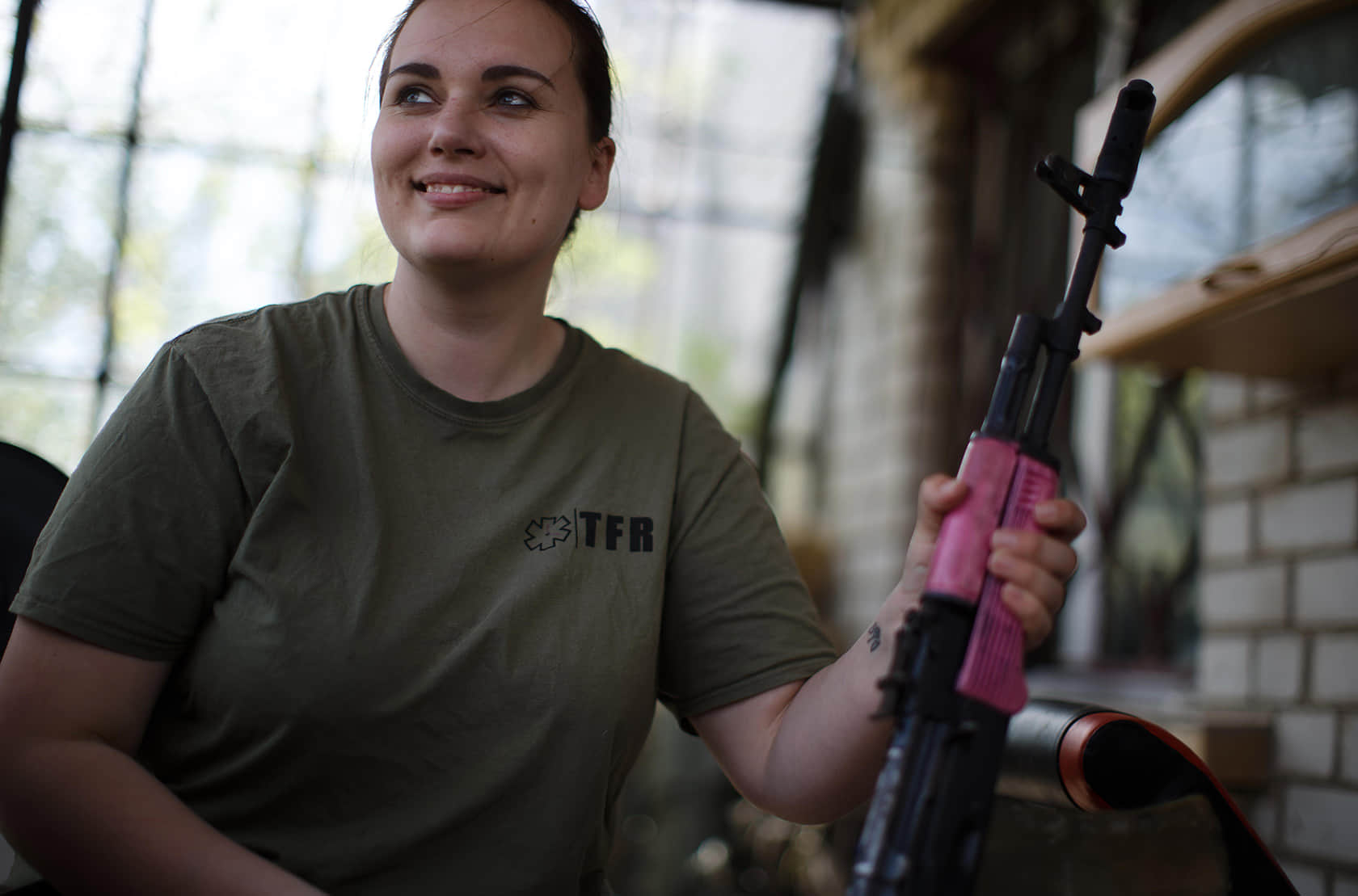
Do you feel offended by people who didn’t join up or volunteer in 2014?
Back then, we were in a club of naïve people who enjoyed being involved in the war somehow. The troops were so dependent on volunteers back then that it’s hard to imagine [that someone could have been offended then – ed.].
Now, I definitely don’t understand people who haven’t joined the resistance as troops or volunteers. But I’m not offended by those who didn’t join earlier. Because I’ve seen those people, I’ve visited their schools, I understand why this happened. I love them. There is a feeling of great love and a desire to restore justice, to unite with them.
By the way, talking of schools: your documentary Vidstan (Distance) was about 20 teenagers from Donetsk and Luhansk oblasts. Do you know what happened to them after the full-scale Russian invasion?
Most of them left the occupied territories and moved to Dnipro or Lviv or abroad. There are some children whose parents decided to stay because they had businesses there. And this is truly terrifying, because these were Ukrainian-speaking children from Ukrainian-speaking families who definitely had no intention of identifying as Russians. They’ve never even been to Russia, despite living so close to the border. That makes it even sadder.
How did you feel on 24 February 2022 in Sievierodonetsk when you realised that Russia had started the full-scale war?
I had no clear understanding of what was going on until, maybe, 25 February or so. I was looking forward to the premiere of my documentary. I’d written a speech for some very senior Ukrainian officials about how we were going to facilitate inclusion for teenagers in their remote regions – it had taken me a long time to write it. It seemed to me that on 24 February America would say: "We’ll strike [Russia] with nuclear weapons!" and on 25 February everyone would come to the Zhovten cinema to see my film and we’d talk about how terrifying it had been to experience one whole day of war.
That didn’t happen. I had to accept reality, go down to the basement of the seminarians of St Michael's Golden-Domed Monastery, where our battalion was deployed in the early stages of the war, and set to work. The Hospitallers had started preparing earlier, but I’d had this film… I thought everyone had gone a little crazy over the war. How can a war like this even happen?
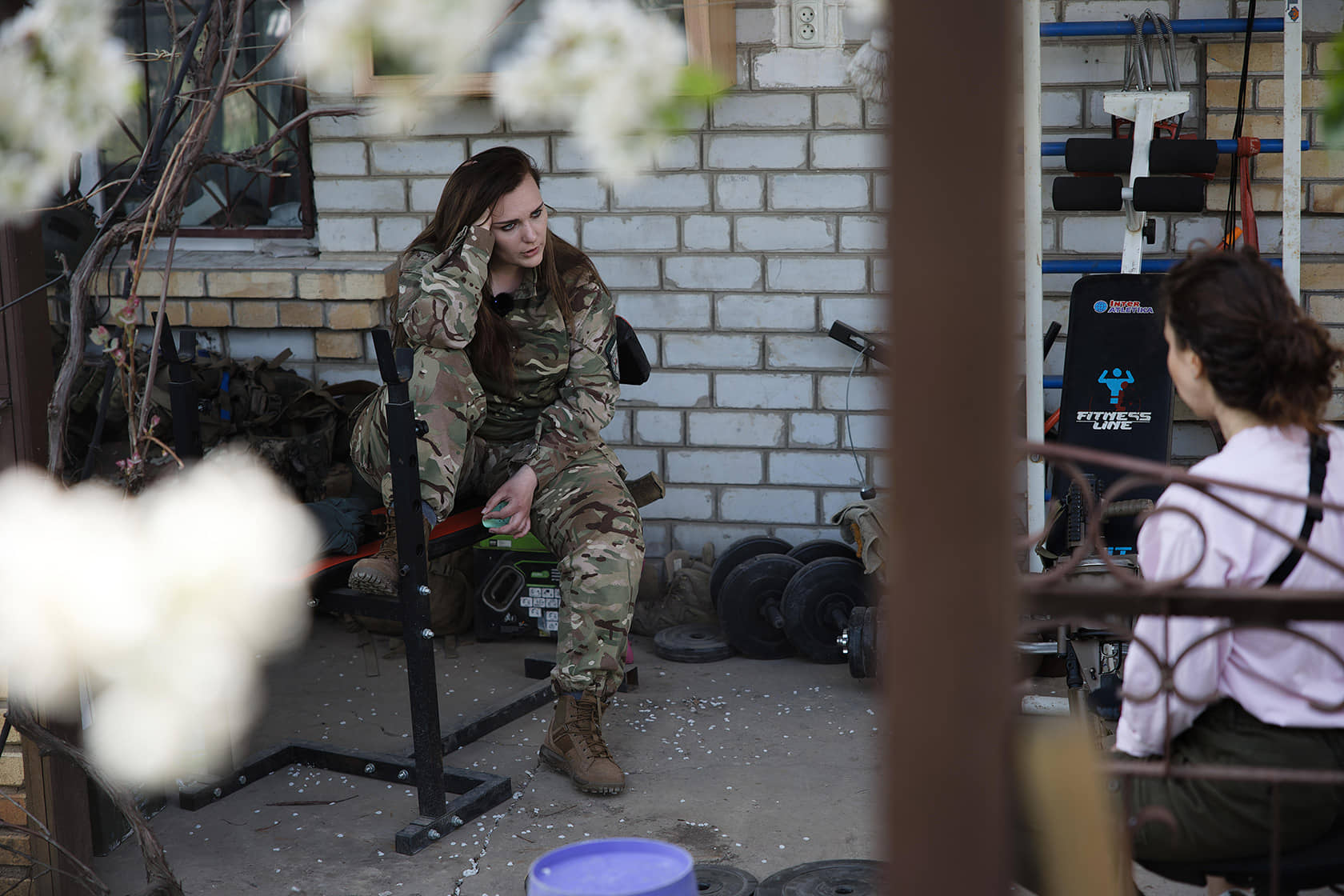
If I remember rightly, during the defence of Kyiv Oblast, you had doubts about whether Ukraine could even resist the invasion?
On 26 February or so I found myself in a huge courtyard where there was a bonfire of criminal cases burning – that must have been the protocol of the law enforcement agency. The blaze was so huge that all these bits of documents with the Ukrainian coat of arms were falling on my head like snow. At that point I thought we were done for, that the tales about "two or three weeks" [the timeframe within which the war was reportedly supposed to end – ed.] that my mum was listening to in Lviv were not realistic. I was horrified by how different the agenda shown on TV was from what we saw in reality.
And then we evacuated the first person to a hospital in Akademmistechko, a residential area on the outskirts of Kyiv, and it seemed to me that we were going to lose our country. Because Russia was already so close that I was having to evacuate people to Akademmistechko.
My friend from the 80th Separate Galician Air Assault Brigade was in the occupied city of Kherson. This was to some extent his conscious decision, as he was working for Ukrainian counter-intelligence. Now, talking about him, I’m proud of him, but I feel scared by what he was involved in. Back then I thought: we’re all going to die anyway, why did he even stay there? He could have fought with us for a bit longer, but there he would surely be killed by the Russians.
He is still alive, although one of his limbs was amputated. So far we’re still alive.
Can you single out one front where it was hardest for combat medics to work?
I haven’t been to Krynky [Kherson Oblast], but I think it’s hell there. Personally for me, working in the Serebrianka Forest [Luhansk Oblast] was the hardest. Both the length of the evacuation route and the quality of the road were hellish. We’d barely make it out of there alive, let alone the wounded people. It was an hour-long evacuation on a horrible road under constant Russian attacks, including FPV drones, and you had to provide first aid as well.
It’s okay if it only takes 20 minutes – you just mobilise and start to give the wounded person first aid. But if a soldier has been seriously injured and the evacuation takes an hour… That forest was the hardest period physically. Emotionally, Kyiv Oblast was the hardest. That wasn’t just the injustice, that was something which moved you on a much more profound level and told you to protect these people.
Why the fuck do they to take their cat and leave their home? Why does a seven-year-old child have to be shielded from Russian attacks by Defence Intelligence of Ukraine, which hands the child over to us to be evacuated so that they can live in peace at last?
If I remember rightly, during the defence of Bakhmut, you were the person who went on Twitter to find an armoured vehicle for evacuating the wounded?
I did that because I knew I was effective on the first evacuation line. We had (and still have) everything we needed for [medical] assistance, but we weren’t allowed to evacuate in our old car – that was the commanding officer's condition. So I was looking for an armoured vehicle in the sector to start evacuating the guys.
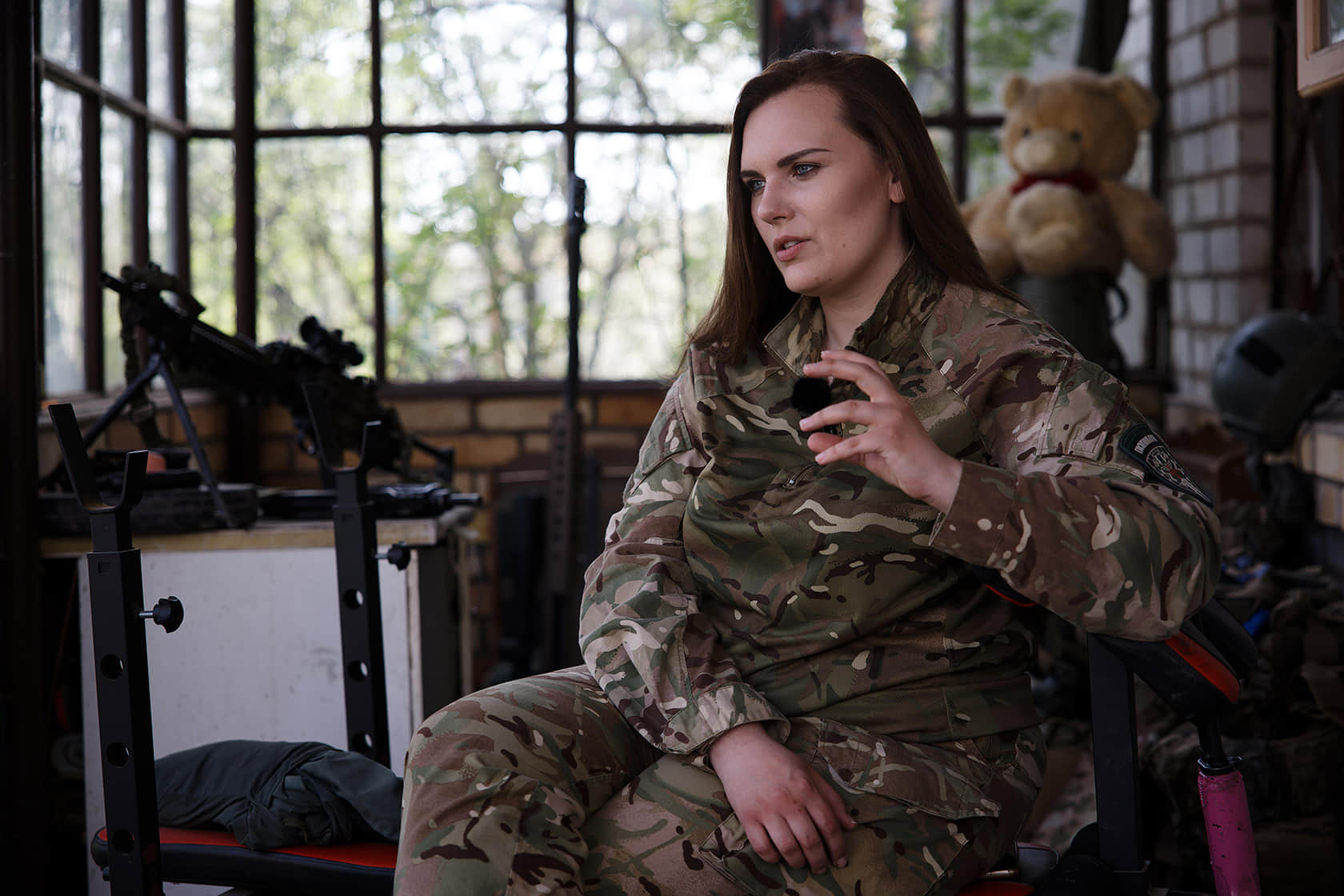
Have you heard a song by the band Antytila called Fortress Bakhmut?
That’s our favourite meme. No offence to Antytila, but seeing all this trash and intensity… Every time the guys went on missions, I worked with them and didn't know if they would ever return, given the situation. So to defuse the situation, we’d shout this song loudly to each other.
It was very over the top for us. But perhaps it’s very timely and important for society, who knows?
Chaos with signs of wannabe autocracy, the Donetsk Oblast sign, and honouring memory
A question for you as someone who used to work in the media in civilian life, for Suspilne: how much does the official information policy of the General Staff and the President’s Office coincide with what you see on the front line?
We see a chaotic information policy and signs of wannabe autocracy from the President’s Office. We have unreasonably high expectations of the military, excess information about the offensive, and claims that it will all be over soon. And when the offensive doesn’t go as expected, the public is really demoralised – more than the military personnel who went on the offensive.
These are the shortcomings of the information policy.
Thank God the president has now said that we could lose without America's help. We've known this since last autumn. How can our economy cope if we’re paying taxes to keep the army functioning? The terrifying thing is that no one has any answers to these questions.
An agenda of endless victory will one day result in no one wanting to mobilise, because everything will be revealed as a complete deception.
Isn't it too late for the authorities to tell the truth?
By "the authorities", I would like us to be able to mean specific individuals. I would especially like to explain to the President’s Office that we are not children. And after everything that Ukrainian society has been through, they shouldn’t talk to us like naive children. It won't work.
So is it too late? Yes, this should never have happened. We should have lived in an objective reality.
Now we have no human resources, and we are saying that we could lose the war. At the end of the day, we’re adults; we need to be prepared for that reality rather than live in a world where we’re told, "Just hold on, everything’s going to be fine."
Maybe it’s not going to be fine at all in the coming years. Perhaps our economy won’t hold up, money that should have been allocated won’t be allocated, maybe we won’t be able to fund our army. These are all real-world scenarios.
None of the responsible people have a plan B, so we need to prepare for the worst. In doing so, it also matters not what position you take for your own benefit, but what values you hold onto. The values of "peace at any price" are not ours. They don’t work.
I believe we should fight as hard as we need to.
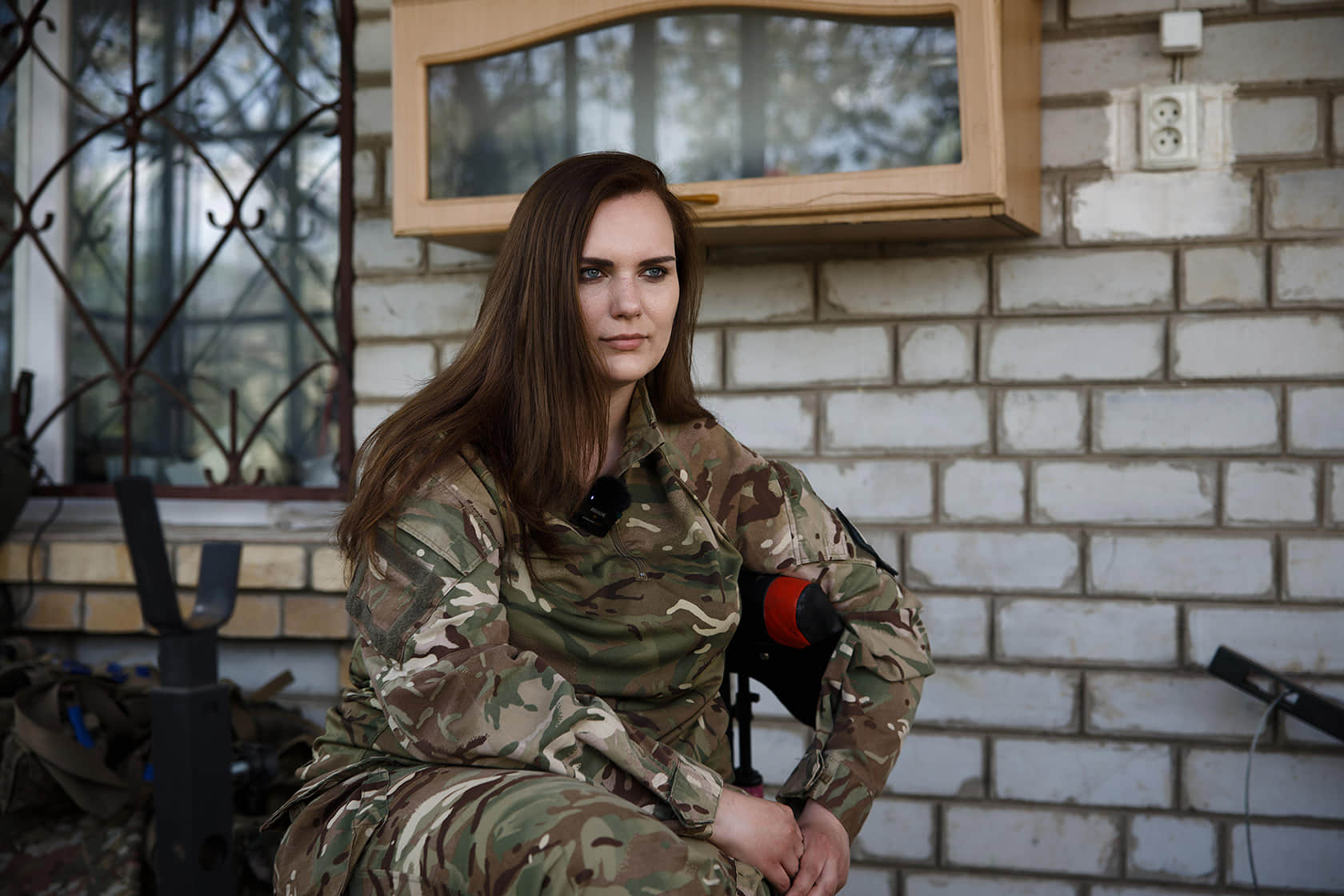
Today, you mentioned the sign marking the entrance to Donetsk Oblast where the writings and stickers left by military personnel and volunteers were painted over. Why are you so upset by this?
The Donetsk Oblast sign was a wonderful example of spontaneous memorialisation. We had names and stickers left there by people who are no longer with us. There’s nowhere else where you can literally write yourself into history with your hand, your handwriting. It’s a unique opportunity.
I thought that one day, when we’d won, we’d dismantle that sign and give it to a cool museum. Anyone who was still alive would be able to come and say, "This is my brother-in-arms; he is dead. And this is my signature." Everyone would be able to show their child this element of the fighting, because there is huge interest in it.
The Soviet Union didn’t just teach us not to develop memory; it also taught us to forget. It turns out that the oblivion of our tragedies is so ingrained in us that some people are capable of daubing yellow paint over someone’s writing: "Glory to Ukraine! Kot [their name], such-and-such a year, I’m going to such-and-such a place." It's shocking that anyone could dare touch it, just because they feel they have to do things the way they’ve always been done.
What stage do you think the policy of honouring memory in Ukraine is at now?
There is no policy of honouring memory in Ukraine. To start talking about memory policy, you need to understand what it is.
If we understand cultural or national trauma as key to shaping our identity, then if we stay alive, we automatically become responsible towards the dead. Responsible people remember and talk about what happened. This is – how can I put it – the path to re-traumatisation.
There is another concept. When we understand a nation as a spiritual principle, memory is the foundation of that nation. This nation has a common heritage of memories. That's why remembering is so strategic. Memory is the basis on which this nation, as a spiritual principle, exists at all.
Again, if we are to have a memory policy in Ukraine, we need research. We need to understand how to make memory simple and accessible to our neighbour in the apartment next door, who listens to Russian music and doesn’t stop for the minute of silence while they’re out shopping at the ATB-Market – so that this memory can be a tangible thing. [Every day at 09:00, throughout Ukraine, a minute of silence is observed to honour and commemorate the fallen defenders.]
Until we have done our research, we won't understand the audience. We understand the audience that’s easy to reach: the victims’ families and brothers-in-arms, and active citizens. But how do you reach everyone else? "Oh, it’ll just happen somehow."
"We’ve organised x number of events, x number of people attended them, x number of concepts have been implemented" – memory can’t be measured by KPIs like those. It must be measured, again, by whether my neighbour will stop for a minute of silence in the ATB-Market because this is important to him. Because he realises that he has this day to live thanks to someone who died, and he honours them for that.
State agencies are not project offices, and they should not take measures. The role of the state and relevant ministries in developing significant strategic policies is crucial. The strategy is fundamentally crucial for our re-traumatisation, so we never forget what happened.
The strategy plans for and presents the honouring of memory, the national idea of memory, as a very long process. Not for those who witnessed Russian evil today, but for those who will continue to do so.
Even when Russia lowers its level of autocracy, I would very much like all who live after me to be aware of its threat.
Text: Olha Kyrylenko, Photo: Dmytro Larin.
Video: Olha Kyrylenko, Dmytro Larin, Alex Klimov
Translation: Myroslava Zavadska, Olya Loza, Polina Kyryllova
Editing: Teresa Pearce